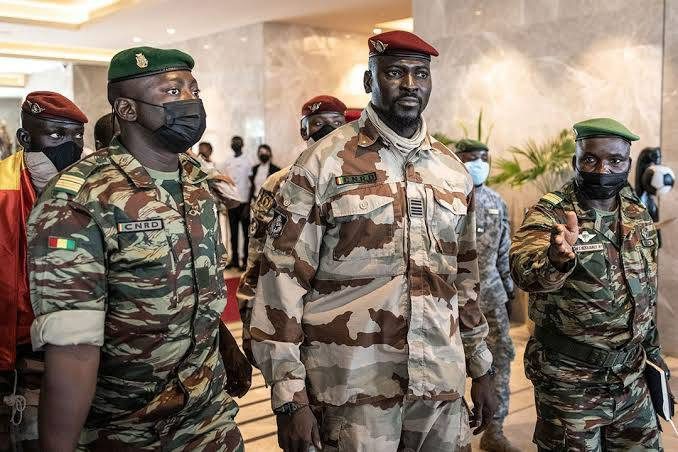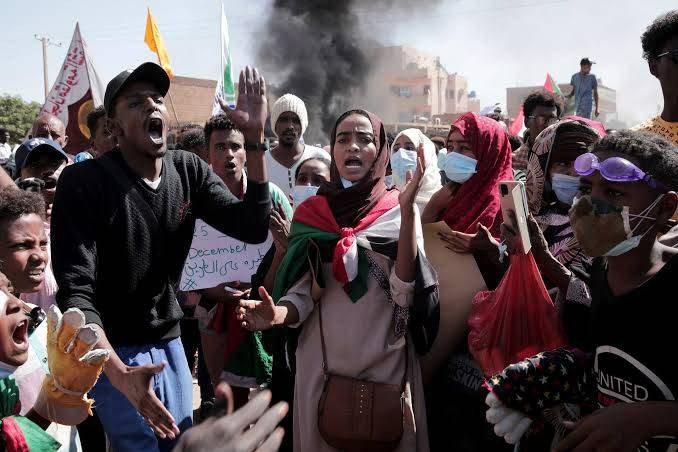Koert Lindijer has been a correspondent in Africa for the Dutch newspaper NRC since 1983. He is the author of four books on African affairs.
A war of extermination in Sudan, military coups in the Sahel, millions of new people displaced by Muslim radicals or other extremist violence, and above all: many angry citizens. All these negative trends made 2023 a bleak year for Africa. As early as the end of 2022, residents felt that things were going in the wrong direction for their countries, according to Afrobarometer. A year later it appears that confidence in democracy is also continuing to decline. A majority of young and old Africans still support democracy, but six in 10 young people are dissatisfied with the way democracy is functioning in their country, according to a new poll by the polling firm.
The afro-barometer had actually risen sharply in recent years, swinging from ‘The lost continent’ of the eighties and nineties to ‘rebirth’ after the turn of the century. Since then, Afro optimism has prevailed in almost all countries. After years of uniformity in the one-party states shortly after independence, competitive elections took place almost everywhere under the new pluralism following the reintroduction of the multi-party system and with the advent of the Internet, freedom of expression and freedom of doing business increased. Almost all economies grew strongly, commodity prices rose, and Africa’s new partner China gave billions in loans. A rising middle class promoted stability and military coups seemed to be a thing of the past. Strengthened by growing self-confidence, presidents took an assertive position in the new constellation of world powers in which Africa occupies a strategic place for the first time after its humiliated dependence on the West or the Soviet Union during the Cold War.
That progress is now at stake. In 2023, citizens in numerous African countries demonstrated against high inflation; they can no longer cope with the price increases. Due to the war in Ukraine, less grain arrived, resulting in skyrocketing food prices, while the consequences of the corona lockdowns were still there. The anger about social decline is palpable in all countries and the desire for change is urgent: sixty percent of the population no longer believes that democracy works in their country.

The crowds cheering for the military juntas in Niger, Chad and Mali appear to be the consequence of a widespread aversion to failing civilian elites, rather than an aversion to democracy per se. Murithi Mutiga of the International Crisis Group wrote in Foreign Policy late last year: “Militaries intervene where the political classes are unable to provide solutions to pressing problems, whether related to security, public services or wealth redistribution. Often, civilian rule has led to bad governance, and desperate citizens look to military rule as a ready-made alternative.”
So, the issue is that civilian governments lack legitimacy. For the upcoming youth – sixty percent of Africans are under the age of 25 – having grown up with their parents’ optimism for a better future, suddenly nothing good lies ahead anymore. Elections do not solve development problems; they rarely lead to political change, and they do not end poverty.
When Africa came to be called the lost continent in the 1990s, the economies grew little or no more. And the high debt burden scared off investors. Those gloomy times loom again as a nightmare. Aided by Afro optimism, economic reforms and a massive multilateral debt relief program led by the IMF, Africa’s debts were largely written off in 2005. Then, with Chinese loans on offer and high commodity prices, many countries started taking on new debt.
Now, according to institutions such as the World Bank and the IMF, the continent is quickly heading towards a new major debt crisis. China appears to be less generous: in 2016 it gave 28 billion dollars in loans, in 2022 only one billion. Zambia, Ghana and recently Ethiopia have already defaulted on their repayments. Africa’s debt-to-GDP ratio stands at 65 percent, 10 percent higher than the IMF’s maximum recommended limit. This time it is more difficult than in 2005 to negotiate debt rescheduling, because these debts are mainly contracted with private lenders, or with countries such as China, which does not easily join joint multilateral solutions such as those of 2005.
The correlation between economics and politics is undeniable. According to the findings of the pollsters, it is evident that the inadequate handling of the economy is the primary factor contributing to the erosion of trust in civilian governments. Consequently, this gives rise to heightened political turmoil, leading to conflicts, uprisings, and even coups. Prime Minister Abiy Ahmed, who was brought in as an angel of peace in 2018, plunged Ethiopia into a series of wars in which hundreds of thousands of civilians and soldiers lost their lives. In neighboring Sudan, a popular revolution that started in 2019 went off the rails and Africans are deeply shocked by how quickly the country has spiraled downward into destruction, with large-scale ethnic massacres. Further west in the Sahel, a contagious series of military coups took place, as well as in some West African coastal states. In the first twenty years after the turn of the century there were 13 coups on the continent, seven in the last three years.

Dissatisfaction is fueled by a sense of insecurity. The occurrence of military coups in the Sahel region is taking place within the broader context of the jihadists’ rise. This phenomenon originated in 2011 when Western nations engaged in a conflict against Gaddafi in Libya, resulting in an influx of weapons and extremists permeating the desert and savannah regions. The arid plains of Algeria and Northern Mali, the lush savannahs of the Sahel and Northern Nigeria, and the bleached sandy plains of Somalia have proven to be fertile breeding grounds for both linear terrorists and criminal syndicates controlling smuggling routes. Since 2019, the frequency of attacks carried out by Muslim extremists in the Sahel has quadrupled.
African leaders have their heads in the clouds. They do not sufficiently recognize all these dangers, and this increases the risk of further destabilization.
However, it is possible that this is merely a temporary downturn. Over the last two decades, the continent has significantly strengthened its resilience, emerging unscathed from the 2007 financial crisis. Overall, Africa has experienced substantial development since the beginning of the 21st century. In December, Kenya commemorated sixty years of independence. At the time of its independence in 1963, Kenya had only one university, but now it boasts 68. Like many other African nations, Kenya has undergone a remarkable transformation in the past six decades, with the establishment of more schools and roads. A new and modern Africa is emerging far from the centers of power, propelled by young individuals who distance themselves from the government and leverage new technologies, made possible by the internet, to create opportunities.
But the issue of ineffective governance and corrupt politicians remains prevalent. Even in reasonably stable democratic states such as Kenya and Tanzania, or countries governed by civilian but autocratic regimes such as Uganda, Angola and Zimbabwe, the fluctuating Afro barometer swings dangerously to the negative side, back to Afro pessimism.


